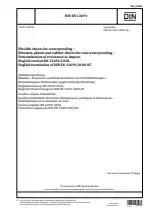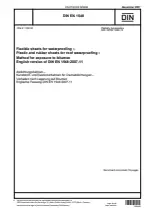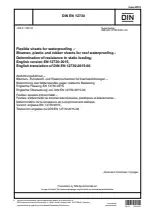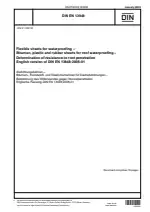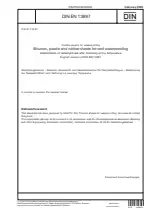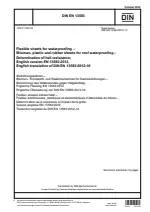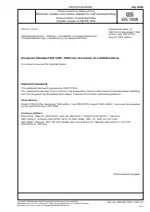Flexible Sheets for Waterproofing - Bitumen, Plastic and Rubber Sheets for Roof Waterproofing - Determination of Resistance to Impact
Also Known As:
The DIN EN 12691 standard describes a test method for determining the resistance to impact of flexible sheets used for waterproofing roofs. The purpose of this test is to evaluate the ability of the sheets to withstand puncture caused by dynamic short-term loads, such as impacts.
The standard highlights that mechanical stress on waterproofing sheets can vary from static long-term loads to dynamic short-term loads. In this case, the focus is on the dynamic category where impact-induced puncture may occur. This test method allows manufacturers and users of waterproofing sheets to assess their performance and suitability for use in roofing applications.
It is important to note that this standard can also be applied for assessing the resistance to impact of flexible sheets used for waterproofing in other contexts beyond roofing. This suggests that the test method described in DIN EN 12691 can be utilized for evaluating the puncture resistance of flexible sheets in various waterproofing applications.
| Descriptors | Bitumen sheets, Bituminous products, Capacitive loads, Checking of defects, Consistency (mechanical property), Construction, Construction materials, Defects, Definitions, Determination, Dynamic loading, Elastomers, Error detection, Impact resistance, Impact tests, Joint efficiency, Loading tests, Mechanical load, Perforations, Plastic sheets, Plastics, Protection against water from the ground, Roof coverings, Roof sealing, Roof sealing sheets, Roof underlays, Sampling methods, Sealing, Sealing means, Sheets, Sheets of elastomer, Shock resistance, Shortage, Short-time load, Sprocket feed holes, Static loading, Surface defects, Test equipment, Testing, Water proof sheetings, Water-proof sheeting for roofs, Short-term exposure, Flatwork ironers, Railways |
| ICS Codes | 91.100.50 - Binders. Sealing materials |
| Language(s) | English |
| File Size | 931.8 KB |

